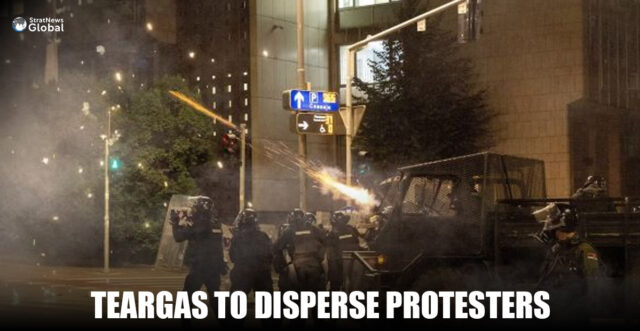Police used teargas and crowd-control vehicles to disperse anti-government demonstrators in Belgrade on Friday who threw firecrackers and flares at officers. The incident marked a significant escalation in the protests that have been ongoing in Serbia for nine months.
The protesters gathered at around 8 p.m. (1800 GMT) in front of the army headquarters building that was bombed in 1999 by NATO. Few hours later they started throwing flares at police officers.
Trash containers were overturned and set on fire. One tree caught fire. The police threw teargas canisters to push protesters away.
Protests were held in several other towns – Novi Sad, Nis, Kragujevac and Valjevo. Teargas was used in Nis as well. There were no official figures on how many people were injured.
Months of protests across Serbia sparked by the deaths of 16 people when a roof on a renovated railway station in Novi Sad collapsed, have rattled President Aleksandar Vucic and his SNS party.
Civilians Injured And Detained
Protests have been mainly peaceful until Wednesday evening when 27 police officers and around 80 civilians were injured in clashes, and 47 people had been detained.
“Every evening we deploy 3,000 policemen across Serbia, they are being beaten and they are being injured,” Vucic told RTS TV earlier on Friday.
Protesters have blamed corruption for the Novi Sad railway station disaster and are demanding early elections in hopes of ousting Vucic and his party.
Students, opposition groups, and anti-corruption watchdogs have accused Vucic and his allies of ties to organized crime, using violence against political rivals, and suppressing media freedoms—allegations they deny.
“I’m closely following events in Serbia, where human rights concerns persist,” Michael O’Flaherty, Council of Europe Commissioner for Human Rights wrote on a Facebook page.
“I deplore the police’s disproportionate force in Valjevo yesterday (Thursday) evening and reiterate my call on the authorities to avoid excessive force, end arbitrary arrests, and de-escalate the situation.”
(With inputs from Reuters)





